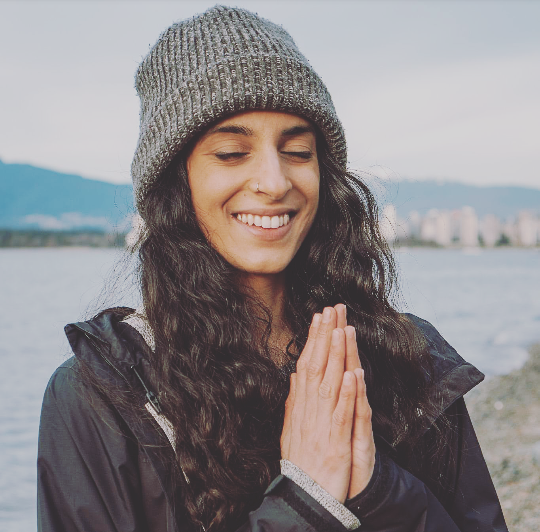Farah Motani (BES '14) is an environmentalist, holistic nutritionist and yoga teacher. She currently resides on the unceded lands of the xʷməθkʷəy̓əm (Musqueam), Səl̓ílwətaʔ (Tsleil-Watuth), and Skwxwú7mesh (Squamish) Nations of the Coast Salish peoples, also known as the settler lands of Vancouver. The environmental studies alumna combined her many passions and has spent the last eight years working in the food security, non-profit, and wellness sectors in Canada, Tanzania and Nicaragua.

What motivated you to study the environment at York and what was your experience like?
Since I was a child, I’ve always been the hippie environmentalist of my family. I had a huge love of animals and nature, and even became vegan when I was thirteen. Growing up as a first-generation Canadian in Toronto, a city with many food deserts; food security and social justice issues developed into huge interests of mine.
When I initially started at York, I didn’t know of the environmental program, and ended up enrolling in a different faculty. Upon learning about the program in my second year, it was a no-brainer for me to switch over.
What I loved about environmental studies was that it was a smaller faculty, and there were a lot of opportunities to connect with others and build community. The instructors were really engaging and focused on alternative ways of teaching that appealed to all learning styles.
Two of my favorite professors were Dr. Frehiwot Tesfaye and Dr. Lisa Fawcett. Their teaching styles and their willingness to take individualized time for their students’ needs stands out. They went above and beyond to connect me with opportunities, wrote reference letters and helped me find answers my questions.
During my time as a student, I had the opportunity to intern with a renewable energy company in Tanzania through YIIP, and in my final year, worked with York’s Sustainability department, through their student employment program. There were also so many other great opportunities on and around campus for students to get hands-on experience to supplement their studies which helped set me up for success after graduation.
What has your post-graduation journey been like?
Immediately after graduation, I worked with Evergreen Brickworks and the Adapting Canadian Workplaces to Respond to Climate Change research project. I spent some time in British Columbia, before moving to Nicaragua for almost 2 years, where I managed a 26-acre permaculture farm and research centre. Whilst abroad, I realized the huge importance of nutrition in the food security realm of work and decided to move to Vancouver to pursue nutrition school. Although my initial intention was to leave after school, I’ve been pleasantly surprised by all the amazing opportunities here in Vancouver, especially in the environmental, food security and wellness movements, and have been here for three years!
What projects are you currently working on?
I realized early on with my personality and interests, rather than having one typical nine-to-five job, I’d thrive working on multiple opportunities at once. Since moving to Vancouver, I’ve found myself engaged with many amazing organizations.
For the last three years, I’ve worked with the non-profit Vancouver Fruit Tree Project as their coordinator. Our volunteers harvest extra fruit from backyard fruit trees that produce more than their owners can eat, and then redistribute it to community groups that offer food programming. In the past 20 years, we have picked and redistributed more than 80,000 pounds of fruit!
I’ve also spent the last year working for a food literacy non-profit called Growing Chefs. We work with schools to teach kids about nutrition, gardening and cooking. This past year, despite schools being closed, we were still able to reach 83 classrooms and over 2,500 kids through virtual programming. We also collaborated with other organizations to pivot our LunchLab in-school meal program, to offer students and their families delicious, healthy, chef-prepared meals outside of school.
When I do have some downtime from these opportunities I also work at a yoga studio managing their educational programming, teach yoga and run my own nutrition business.
I am so fortunate to work in industries that value work-life balance, and I am still able to take care of myself and do the things I love. I think it’s really important to find what works for you. I feel like our society pushes having one, nine-to-five, Monday-to-Friday job for the rest of your life, but I think our generation is really lucky as there are so many more opportunities. I’ve found that you can have multiple jobs that make up the same hours. I’ve also been fortunate to work in different places, and change my job every few years for new, exciting opportunities. If you do a good job, are resourceful and are passionate about what you do, there will always be opportunities for you.
What are your plans for the future? Do you have any personal or professional goals you’d like to meet?
I envision a lifestyle where I’m in Canada part of the year and abroad part of the year. My family has roots in parts of East Africa and I have a dream to invest in a property, likely in Kenya, to co-create a space (mixture of a wellness centre, permaculture farm, and food hub) where people can connect, learn, grow, eat and be their best selves.
